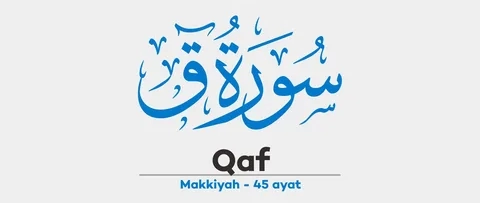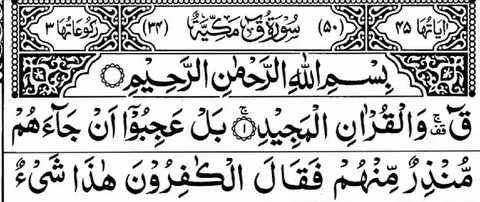Surah Qaf, the 50th chapter of the Quran, is a profound source of inspiration and guidance for Muslims around the world. Its verses are believed to be a powerful reminder of the reality of the afterlife, the resurrection, and the ultimate judgment of human deeds by Allah, in this article on Arabian Tongue we will explorer benefits of surah qaf.
Understanding Surah Qaf

Surah Qaf was revealed in Mecca and comprises 45 verses. It focuses extensively on the themes of resurrection, the accountability of human actions, and the undeniable reality of the Hereafter. These themes are meant to awaken the soul to the ephemeral nature of earthly life and the eternal nature of the life to come.
benefits of surah qaf
Surah Qaf, the 50th chapter of the Quran, holds several benefits and significance for those who recite and reflect upon it. Here are some of the key benefits:
Spiritual Benefits
Engaging with Surah Qaf can lead to heightened spiritual awareness. It serves as a reminder of the mighty power of Allah and His omnipresence, which can comfort believers by reminding them that they are never alone in their struggles, read more surah naas benefits
Psychological Benefits
This Surah can be particularly comforting to those experiencing anxiety and stress. Its verses reinforce the sovereignty of Allah over all things, which can help alleviate fears about the unknown and the future.
Social Benefits
Surah Qaf encourages believers to act justly and to fulfill their responsibilities towards others, fostering a sense of community and mutual responsibility.
Educational Benefits
The Surah provides profound insights into the concepts of life after death and the creation of the universe, which are fundamental aspects of Islamic teaching. It challenges believers to reflect on these concepts deeply, read about surah hud benefits
Practical Benefits
The recitation of Surah Qaf is incorporated into various Islamic rituals and can guide daily decision-making by reminding believers of the values they should uphold.
Historical Significance
Surah Qaf holds historical and theological significance within Islamic tradition, particularly emphasizing the resurrection and the reality of the afterlife. Here’s a deeper look into its historical significance:
- Emphasis on the Resurrection: Historically, the concept of resurrection was met with skepticism and disbelief by many in Meccan society. Surah Qaf addresses these doubts directly, providing detailed arguments about the feasibility and inevitability of the resurrection. This was crucial for reinforcing the message of accountability in the hereafter.
- Support for the Prophet: The surah served as a form of support and consolation for Prophet Muhammad. It reassured him when he faced rejection and ridicule from the disbelievers, emphasizing that previous prophets had faced similar opposition.
- Divine Assurance: It contains reassurances of God’s comprehensive knowledge and power, demonstrating through natural signs and human creation itself, which served to strengthen the resolve of the believers.
- Literary Excellence: The surah is also noted for its powerful rhetoric and eloquence, which challenged the disbelievers’ claims and showcased the divine origin of the Quran. The repetitive questioning style and vivid descriptions in Surah Qaf are aimed at making listeners reflect on the signs around them and the ultimate return to God.
- Guidance and Warning: Like many surahs revealed in Mecca, Surah Qaf provides both guidance for the believers and warnings to the disbelievers about the consequences of their denial.
- Regular Recitation: Many Muslims make it a habit to recite Surah Qaf regularly, especially on Fridays, as it is believed to remind believers of the Day of Judgment. Regular recitation can help maintain a connection with the Quranic teachings and instill a sense of accountability for one’s actions.
- Reflection and Meditation: Taking time to reflect on the meanings and themes of Surah Qaf can enhance one’s understanding of life after death, the power of God’s creation, and the truth of resurrection. This reflection can lead to greater spiritual awareness and mindfulness in daily activities.
- Spiritual Enlightenment: The surah emphasizes the temporary nature of life and the eternal aspect of the hereafter, which can encourage a person to prioritize spiritual growth and ethical living over materialistic pursuits.
- Guidance in Difficult Times: The assurances and reminders of God’s omnipotence and justice can offer comfort and guidance during challenging times, reinforcing the belief that everything in this world happens under divine wisdom.
- Teaching and Learning: Sharing the lessons from Surah Qaf with family and friends can be a way of spreading its profound messages, encouraging a community-wide reflection on life, death, and the hereafter.
FAQs
What is the main theme of Surah Qaf?
The main theme of Surah Qaf is the affirmation of the resurrection and the afterlife. It emphasizes the reality of the Day of Judgment and accountability for one's actions.
How can Surah Qaf help me in my daily life?
Surah Qaf can provide spiritual guidance by reminding you of the impermanence of life and the reality of the afterlife. It encourages living a righteous life, being mindful of one’s actions, and maintaining a strong connection with God.
Are there any scientific facts mentioned in Surah Qaf?
Surah Qaf discusses aspects of creation, such as the creation of humans and the natural world, in a manner aimed at provoking reflection on God's power and mastery over the universe.
How does Surah Qaf enhance community relations?
By emphasizing accountability and the afterlife, Surah Qaf can encourage a community to uphold ethical values and justice.
Can non-Muslims gain insights from Surah Qaf?
Yes, non-Muslims can gain insights from Surah Qaf through its philosophical and ethical teachings. The surah’s exploration of life, death, and the hereafter can offer valuable perspectives on the meaning and purpose of life, human responsibility, and the nature of existence.
Conclusion
The diverse benefits of Surah Qaf demonstrate its significant role in the spiritual, psychological, and social lives of Muslims. It offers a comprehensive guide that spans this life and the next.



